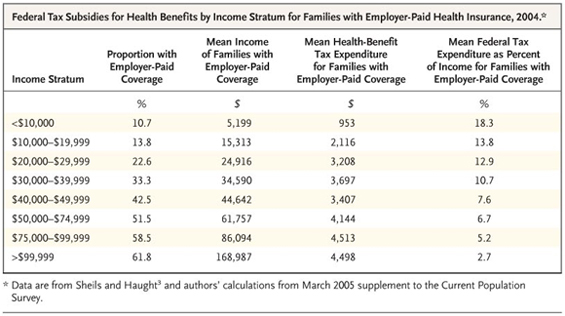FOR IMMEDIATE RELEASE
August 20, 2009
Contacts:
David Himmelstein, M.D.
Steffie Woolhandler, M.D., M.P.H.
Mark Almberg, Physicians for a National Health Program, (312) 782-6006, mark@pnhp.org
CAMBRIDGE, Mass. – As the debate over health care reform continues to unfold in town hall meetings and on Capitol Hill, a new study by two Harvard researchers has found that taxing job-based health benefits would heavily penalize insured, working families.
The study, titled “The regressivity of taxing employer-paid health insurance,” appears in the August 19 online edition of the New England Journal of Medicine. It was written by Drs. David Himmelstein and Steffie Woolhandler, professors at Harvard Medical School and primary care doctors at Cambridge Hospital in Massachusetts.
The taxation of employer-sponsored health benefits has been advocated by many health economists and lawmakers, including some members of the influential Senate Finance Committee, which is now drafting health care reform legislation. President Obama has said he has not ruled out such a tax to fund his reforms.
Analyzing income and insurance data from the 2005 Current Population Survey of the U.S. Census Bureau and other sources, the authors reveal that taxing workers’ job-based health insurance would cost those with low-incomes ($0- $10,000 annually) 18.3 percent of their income, but cost high-income (over $100,000) families a mere 2.7 percent. (See the table from the study at http://healthcarereform.nejm.org/?p=1521)

The authors note that the tax rate would drop even lower for the super-rich. “A Goldman Sachs executive who enjoyed the firm’s infamous $40,543 health plan got a federal tax subsidy of about $15,367 last year,” they write. “But that’s only 0.13 percent of the bonuses received by the company’s four top earners. So though taxing health benefits would spare the uninsured, the average poor family with employer-paid coverage would be taxed at a rate 140 times higher than Wall Street titans.”
Dr. David U. Himmelstein, lead author of the study and associate professor of medicine at Harvard, added: “Most economists and many politicians have claimed that taxing health benefits would hit the wealthy hardest, while sparing the poor. But exactly the reverse is true. For a poor, insured family a tax on their health benefits would take almost one-fifth of their total income.”
Dr. Steffie Woolhandler, co-author and professor of medicine at Harvard, said: “Instead of taxing benefits, politicians should embrace the only affordable option for universal coverage: a single-payer, Medicare-for-all program. Single-payer would save $400 billion annually by simplifying administration, enough to assure quality care for everyone. We cannot afford to keep wasteful private health insurers in business, and pay for it off the backs of working families.”
Himmelstein and Woolhandler are co-founders of Physicians for a National Health Program, an organization of 16,000 doctors and medical professionals who advocate for single-payer national health insurance.
*******
A copy of the study is available from the New England Journal website at http://healthcarereform.nejm.org/?p=1521
“The Regressivity of Taxing Employer-Paid Health Insurance,” David U. Himmelstein, M.D; Steffie Woolhandler, M.D., M.P.H. New England Journal of Medicine, August 19, 2009.
Drs. Himmelstein and Woolhandler are available for comment on their new study and on other aspects of the health care reform debate. To contact other physician-spokespersons from Physicians for a National Health Program in your area, visit www.pnhp.org/stateactions or call (312) 782-6006.
